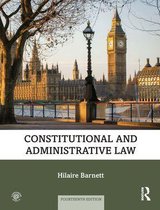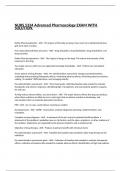Constitutional Lecture 30.01.19
3 different types of bias:
a) Actual (rare)
b) Automatic disqualification
c) Apparent bias
Actual bias=decision maker actually bias so we can challenge decision they make; (however
it’s rarely encountered since it’s difficult to prove); subjective question; type of bias courts
recognise but in reality it’s rare
Automatic disqualification bias:
presumption of bias; e.g. judge/decision maker has financial interest in outcome of
case.
Financial interestDimes v Grand Junction Canal-judge had pecuniary interest in
outcome of case; Lord Chancellor had big share so it was decided they shouldn’t
have taken that decision and should’ve been automatically disqualified; Lord
Chancellor’s decision was quashed.
Partly in own cause Pinochet-non-pecuniary interest, Met. Police arrested
Pinochet in London although arrest was issued for Spain, case about whether they
should extradite Pinochet, made all the way to HoL and one of them was Lord
Hoffman, 3:2 (heart by 5 Lords and that they should extradite), found that Lord
Hoffman had relationship with Amnesty Int (who put forward arguments in case),
goes back to HoL and they agree that Hoffman should’ve automatically disqualified
himself (since he was so closely and actively associated), goes back to HoL and
redecided that he should be extradited, BUT in the end he wasn’t due to external
reasons. Due to Pinochet judgment, parameters of this category=uncertain
Locabail v Bayfield Properties number of cases combined to show what constitutes
automatic disqualification; it does extend beyond pecuniary interest; cases should
be dealt with apparent bias; could outcome of case realistically affect Judge’s
interest (trying to limit)
Apparent bias:
have to think about this more; appearance of bias
Test for apparent bias (Gough) Juror neighbour of one of co-accused; 3 Part test
(courts role)
1. Ascertain circumstances
2. What does court think?
3. Does the court think there was a real danger of bias? (high threshold?)
Test criticised so didn’t adopt it?
Medicines case, fixing prices artificially high (drug companies), Retail Price
Maintenance for over counter medicines to be decided by Restrictive Practices Court
(judge plus two members); one of expert members (while trial is ongoing) decides to
ask firm for a job (Frontier Economics who tell Competitional Auth who tells courts
and it reaches High Court), Court of Appeal uses this chance to revise Gough; Change
to Gough in light of HRA. Revised test:
1. Ascertain circumstances
2. What would a fair-minded observer think? (objective)
3. Would a fair-minded observer see a real possibility of bias?
Magill v Porter- political corruption-trying to win council elections by selling off
counsel houses in marginal wards (conservative party in West Minister) for
votes, unlawful as they were acting for improper purpose, cost council money,
District Auditor wanted to get tax payer money back, £30mn, DA investigates
3 different types of bias:
a) Actual (rare)
b) Automatic disqualification
c) Apparent bias
Actual bias=decision maker actually bias so we can challenge decision they make; (however
it’s rarely encountered since it’s difficult to prove); subjective question; type of bias courts
recognise but in reality it’s rare
Automatic disqualification bias:
presumption of bias; e.g. judge/decision maker has financial interest in outcome of
case.
Financial interestDimes v Grand Junction Canal-judge had pecuniary interest in
outcome of case; Lord Chancellor had big share so it was decided they shouldn’t
have taken that decision and should’ve been automatically disqualified; Lord
Chancellor’s decision was quashed.
Partly in own cause Pinochet-non-pecuniary interest, Met. Police arrested
Pinochet in London although arrest was issued for Spain, case about whether they
should extradite Pinochet, made all the way to HoL and one of them was Lord
Hoffman, 3:2 (heart by 5 Lords and that they should extradite), found that Lord
Hoffman had relationship with Amnesty Int (who put forward arguments in case),
goes back to HoL and they agree that Hoffman should’ve automatically disqualified
himself (since he was so closely and actively associated), goes back to HoL and
redecided that he should be extradited, BUT in the end he wasn’t due to external
reasons. Due to Pinochet judgment, parameters of this category=uncertain
Locabail v Bayfield Properties number of cases combined to show what constitutes
automatic disqualification; it does extend beyond pecuniary interest; cases should
be dealt with apparent bias; could outcome of case realistically affect Judge’s
interest (trying to limit)
Apparent bias:
have to think about this more; appearance of bias
Test for apparent bias (Gough) Juror neighbour of one of co-accused; 3 Part test
(courts role)
1. Ascertain circumstances
2. What does court think?
3. Does the court think there was a real danger of bias? (high threshold?)
Test criticised so didn’t adopt it?
Medicines case, fixing prices artificially high (drug companies), Retail Price
Maintenance for over counter medicines to be decided by Restrictive Practices Court
(judge plus two members); one of expert members (while trial is ongoing) decides to
ask firm for a job (Frontier Economics who tell Competitional Auth who tells courts
and it reaches High Court), Court of Appeal uses this chance to revise Gough; Change
to Gough in light of HRA. Revised test:
1. Ascertain circumstances
2. What would a fair-minded observer think? (objective)
3. Would a fair-minded observer see a real possibility of bias?
Magill v Porter- political corruption-trying to win council elections by selling off
counsel houses in marginal wards (conservative party in West Minister) for
votes, unlawful as they were acting for improper purpose, cost council money,
District Auditor wanted to get tax payer money back, £30mn, DA investigates



